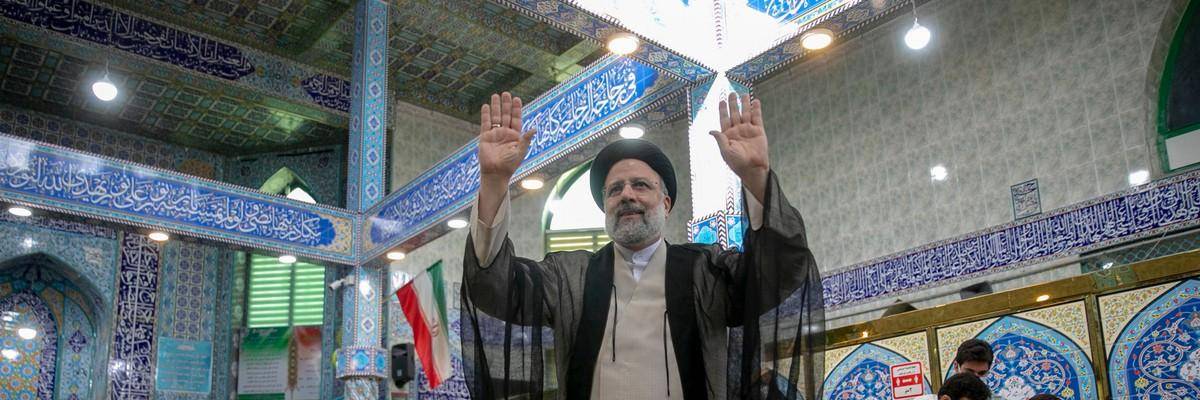

SUBSCRIBE TO OUR FREE NEWSLETTER
Daily news & progressive opinion—funded by the people, not the corporations—delivered straight to your inbox.
5
#000000
#FFFFFF
To donate by check, phone, or other method, see our More Ways to Give page.


Daily news & progressive opinion—funded by the people, not the corporations—delivered straight to your inbox.

Ebrahim Raisi waves to the media after casting his vote at a polling station on June 18, 2021, on the day of the Islamic Republic's presidential election. (Photo: Majid Saeedi/Getty Images)
It was common knowledge that a U.S. failure to rejoin the Iran nuclear deal (known as the JCPOA) before Iran's June presidential election would help conservative hard-liners to win the election. Indeed, on Saturday, June 19, the conservative Ebrahim Raisi was elected as the new President of Iran.
Raisi has a record of brutally cracking down on government opponents and his election is a severe blow to Iranians struggling for a more liberal, open society. He also has a history of anti-Western sentiment and says he would refuse to meet with President Biden. And while current President Rhouhani, considered a moderate, held out the possibility of broader talks after the U.S. returned to the nuclear deal, Raisi will almost certainly reject broader negotiations with the United States.
If Biden fails to rejoin the JCPOA, and if the United States or Israel ends up at war with Iran, this lost opportunity to quickly rejoin the JCPOA during his first months in office will loom large over future events and Biden's legacy as president.
Dear Common Dreams reader, The U.S. is on a fast track to authoritarianism like nothing I've ever seen. Meanwhile, corporate news outlets are utterly capitulating to Trump, twisting their coverage to avoid drawing his ire while lining up to stuff cash in his pockets. That's why I believe that Common Dreams is doing the best and most consequential reporting that we've ever done. Our small but mighty team is a progressive reporting powerhouse, covering the news every day that the corporate media never will. Our mission has always been simple: To inform. To inspire. And to ignite change for the common good. Now here's the key piece that I want all our readers to understand: None of this would be possible without your financial support. That's not just some fundraising cliche. It's the absolute and literal truth. We don't accept corporate advertising and never will. We don't have a paywall because we don't think people should be blocked from critical news based on their ability to pay. Everything we do is funded by the donations of readers like you. Will you donate now to help power the nonprofit, independent reporting of Common Dreams? Thank you for being a vital member of our community. Together, we can keep independent journalism alive when it’s needed most. - Craig Brown, Co-founder |
It was common knowledge that a U.S. failure to rejoin the Iran nuclear deal (known as the JCPOA) before Iran's June presidential election would help conservative hard-liners to win the election. Indeed, on Saturday, June 19, the conservative Ebrahim Raisi was elected as the new President of Iran.
Raisi has a record of brutally cracking down on government opponents and his election is a severe blow to Iranians struggling for a more liberal, open society. He also has a history of anti-Western sentiment and says he would refuse to meet with President Biden. And while current President Rhouhani, considered a moderate, held out the possibility of broader talks after the U.S. returned to the nuclear deal, Raisi will almost certainly reject broader negotiations with the United States.
If Biden fails to rejoin the JCPOA, and if the United States or Israel ends up at war with Iran, this lost opportunity to quickly rejoin the JCPOA during his first months in office will loom large over future events and Biden's legacy as president.
It was common knowledge that a U.S. failure to rejoin the Iran nuclear deal (known as the JCPOA) before Iran's June presidential election would help conservative hard-liners to win the election. Indeed, on Saturday, June 19, the conservative Ebrahim Raisi was elected as the new President of Iran.
Raisi has a record of brutally cracking down on government opponents and his election is a severe blow to Iranians struggling for a more liberal, open society. He also has a history of anti-Western sentiment and says he would refuse to meet with President Biden. And while current President Rhouhani, considered a moderate, held out the possibility of broader talks after the U.S. returned to the nuclear deal, Raisi will almost certainly reject broader negotiations with the United States.
If Biden fails to rejoin the JCPOA, and if the United States or Israel ends up at war with Iran, this lost opportunity to quickly rejoin the JCPOA during his first months in office will loom large over future events and Biden's legacy as president.